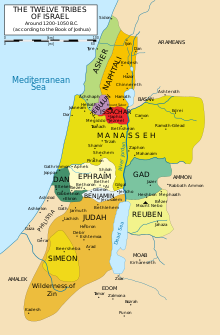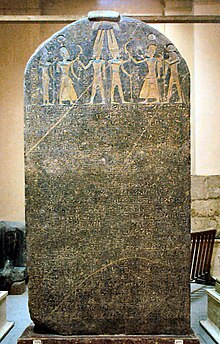Saylor.org's Ancient Civilizations of the World/The Hebrews
The Hebrews or Israelites
[edit | edit source]
Hebrews (עברים) is an ethnonym used in the Jewish Bible. It is mostly taken as synonymous with the Semitic Israelites. The Israelites (בני ישראל) were a Semitic Hebrew-speaking people of the Ancient Near East, who inhabited part of the Land of Canaan during the tribal and monarchic periods (15th to 6th centuries BCE), later evolving into Jews and Samaritans of the Hellenistic and Roman periods, inhabiting the territories of Judea and Galilee, and Samaria respectively, though a Jewish diaspora had already developed outside of Judea and Galilee. In Modern Hebrew usage, an Israelite is, broadly speaking, a lay member of the Jewish ethno-religious community, as opposed to the priestly orders of Kohanim and Levites.
The word "Israelite" derives from the Biblical Hebrew word "Israel". Although most literary references to Israelites are located in the Hebrew Bible, there is also abundant non-biblical archaeological and historical evidence of ancient Israel and Judah. The ethnonym is attested as early as the 13th century BCE in an Egyptian inscription. The Hebrew Bible etymologizes the name as from yisra "to prevail over" or "to struggle/wrestle with", and el, "God, the divine". The eponymous biblical patriarch of the Israelites is Jacob, who wrestled with God who gave him a blessing and renamed him "Israel" because he had "striven with God and with men, and have prevailed." (Genesis 32:24-32) According to the Hebrew Bible, Israelites were the "chosen people" of God. The name Hebrews is sometimes used synonymously with "Israelites".
The biblical term "Israelites" (also the "Twelve Tribes" or "Children of Israel") means both the direct descendants of the patriarch Jacob (Israel) as well as the historical populations of the united Kingdom of Israel. For the post-exilic period, beginning in the 5th century BCE, the remnants of the Israelite tribes came to be referred to as Jews (tribes of Judah, Simeon and partially Benjamin and Levi), named for the kingdom of Judah. This change is explicit in the Book of Esther (4th century BCE). On the other hand, Samaritans (tribes of Menasseh, Ephraim and partially Benjamin and Levi) became named for Samaria. It replaced the title Children of Israel.
History
[edit | edit source]Biblical Israelites
[edit | edit source]The Torah traces the Israelites to the patriarch Jacob, grandson of Abraham, who was renamed Israel after a mysterious incident in which he wrestles all night with God (or an angel). Jacob's twelve sons (in order of birth), Reuben, Simeon, Levi, Judah, Dan, Naphtali, Gad, Asher, Issachar, Zebulun, Joseph and Benjamin, become the ancestors of twelve tribes, with the exception of Joseph, whose two sons Mannasseh and Ephraim become tribal eponyms.

Jacob and his sons are forced by famine to go down into Egypt. When they arrive they and their families are 70 in number, but within four generations they have increased to 600,000 men of fighting age, and the Pharaoh of Egypt, alarmed, first enslaves them and then orders the death of all male Hebrew children. The God of Israel reveals his name to Moses, a Hebrew of the line of Levi; Moses leads the Israelites out of bondage and into the desert, where God gives them their laws and the Israelites agree to become his people. Nevertheless, the Israelites lack complete faith in God, and the generation which left Egypt is not permitted to enter the Promised Land.

Following the death of the generation of Moses a new generation, led by Joshua, enters Canaan and takes possession of the land in accordance with the curse placed upon Canaan by Noah. Yet even now the Israelites lack strength in God in the face of the peoples of the land, and periods of weakness and backsliding alternate with periods of resilience under a succession of Judges. Eventually the Israelites ask for a king, and God gives them Saul. David, the youngest (divinely favored) son of Jesse of Bethlehem would succeed Saul. Under David the Israelites establish the kingdom of God, and under David's son Solomon they build the Temple where God takes his earthly dwelling among them. Yet Solomon sins by allowing his foreign wives to worship their own gods, and so on his death and reign of his son, Rehoboam, the kingdom is divided in two.
The kings of the northern kingdom of Israel are uniformly bad, permitting the worship of other gods and failing to enforce the worship of God alone, and so God eventually allows them to be conquered and dispersed among the peoples of the earth; in their place strangers settle the northern land. In Judah some kings are good and enforce the worship of God alone, but many are bad and permit other gods, even in the Temple itself, and at length God allows Judah to fall to her enemies, the people taken into captivity in Babylon, the land left empty and desolate, and the Temple itself destroyed.
Yet despite these events God does not forget his people, but sends Cyrus, king of Persia as his messiah to deliver them from bondage. The Israelites are allowed to return to Judah and Benjamin, the Temple is rebuilt, the priestly orders restored, and the service of sacrifice resumed. Through the offices of the sage Ezra, Israel is constituted as a holy community, bound by the Law and holding itself apart from all other peoples.
Historical Israelites
[edit | edit source]
In contrast to the Biblical account, it became clear by the 1920s that the idea of an Israelite conquest of Canaan - the story of the book of Joshua - was not supported by the archaeological record. The response of the time was to propose that the main biblical idea was still correct, but that the Israelites entered Canaan peacefully instead of through conquest. Later, this compromise was abandoned, and the Israelites were interpreted to be indigenous Canaanites. The revision of Israelite origins has implications for Israelite religion: whereas the Bible had depicted them as monotheists from the beginning, the new understanding is that they were polytheists who harboured a small and ultimately successful group of monotheistic revolutionaries.
The name Israel first appears c. 1209 BCE, at the end of the Late Bronze Age and the very beginning of the period archaeologists and historians call Iron Age I, in an inscription of the Egyptian pharaoh Merneptah. The inscription is very brief and says simply: "Israel is laid waste and his seed is not". The hieroglyph accompanying the name "Israel" indicates that it refers to a people, most probably located in the highlands of Samaria. Over the next two hundred years (the period of Iron Age I) the number of highland villages increased from 25 to over 300 and the settled population doubled to 40,000. There is general agreement that the majority of the population living in these villages was of Canaanite origin. By the 10th century BCE a rudimentary state had emerged in the north-central highlands, and in the 9th century this became a kingdom. The kingdom was sometimes called Israel by its neighbours, but more frequently it was known as the "House (or Land) of Omri." Settlement in the southern highlands was minimal from the 12th through the 10th centuries BCE, but a state began to emerge there in the 9th century, and from 850 BCE onward a series of inscriptions are evidence of a kingdom which its neighbours refer to as the "House of David."
The rise of the Jews
[edit | edit source]Jews (יְהוּדִים), also known as the Jewish people, are an ethno-religious group originating from the Israelites or Hebrews. According to the Books of Chronicles, chapter 9 line 2, the Israelites, who took part in The Return to Zion were from the Tribe of Judah alongside the tribes of Simeon, Benjamin, Levi, Ephraim and Manasseh, which were absorbed into it.
After the Persian conquest of Babylon in 539, Judah became a province of the Persian empire. This status continued into the following Hellenistic period, when Yehud became a disputed province of Ptolemaic Egypt and Seleucid Syria. In the early part of the 2nd century BCE, a revolt against the Seleucids led to the establishment of an independent Jewish kingdom under the Hasmonean dynasty. The Hasmoneans adopted a deliberate policy of imitating and reconstituting the Davidic kingdom, and as part of this forcibly converted to Judaism their neighbours in the Land of Israel. The conversions included Nabateans (Zabadeans) and Itureans, the peoples of the former Philistine cities, the Moabites, Ammonites and Edomites. Attempts were also made to incorpoarate the Samaritans, following takeover of Samaria. The success of mass-conversions is however questionable, as most groups retained their tribal separations and mostly turned Hellenistic or Christian, with Edomites perhaps being the only exception to merge into the Jewish society under Herodian dynasty and in the following period of Jewish-Roman Wars. While there are some references to maintaining the tribal separation among Israelites during the Hasmonean period, the dominant position of the tribe of Judah as well as nationalistic policies of Hasmoneans to refer to residents of Hasmonean Judea as Jews practically erased the tribal distinction, with the exception of the priestly orders of Levites and Kohanim (tribe of Levi).
The Babylonian Jewish community, though maintaining permanent ties with the Hasmonean and later Herodian kingdoms, evolved into a separate Jewish community, which during the Talmudic period assembled its own practices-the Babylonian Talmud, slightly differing from the Jerusalem Talmud. The Babylonian Jewry is considered to be the predecessor of most Mizrachi Jewish communities.
Attribution
[edit | edit source]"The Israelites" (Wikipedia) http://en.wikipedia.org/wiki/Israelites
